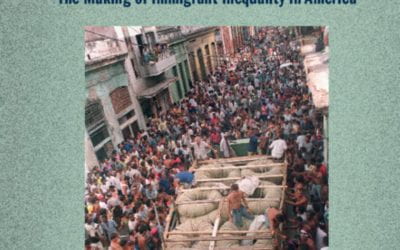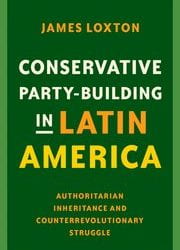Mastering Unity
Covid Vaccine Receptivity in Haiti
There’s only one way to save ourselves—only one, not two. It’s for us to make again one good family of peasants, to call together again in the name of brother to brother our union of tillers of the soil, to share our pain and our labor between comrades and comrades . . .
So implores native son Manuel, who returns to Fonds Rouge, Haiti, after toiling on Cuba’s sugar plantations in Gouverneurs de la Rose´e´ (“Masters of the Dew”), the literary work of Haitian author Jacques Roumain (translated by Langston Hughes and Mercer Cook, Reynal & Hitchcock, 1947). Manuel finds the villagers succumbing to twin evils: prolonged drought that threatens starvation, and a blood feud that divides and distracts. Rising to the moment, his near miraculous discovery of a novel reservoir of water emboldens him to espouse a hopeful message of redemption predicated on collective action. His goal is to form a coumbite, a system of cooperative labor, to construct pipelines down from mountains. Manuel urges the village to set aside legitimate grievances and carry forth the common cause of managing their own fates. In a time of intense fear, he crafts a compelling narrative that the true enemy is not drought but disunity, whose ravages would surely suffer villagers to be stalked by impending death.
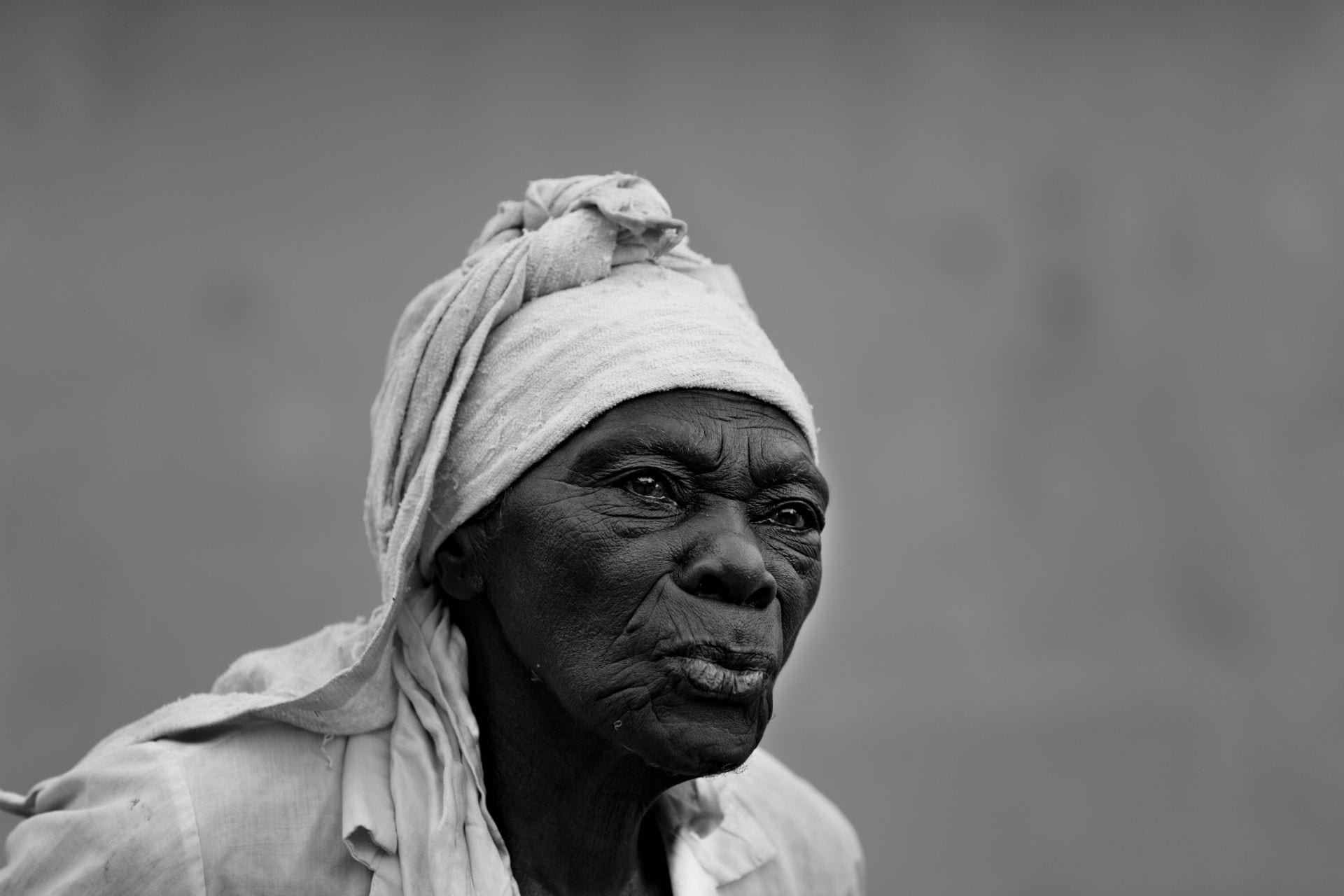
Following historic global isolationism, a resilient generation of Haitian elders confronts the coronavirus pandemic, even as their democracy threatens to fragment into armed factions around them. Do Western vaccine campaigns advance the mission to heal and forge unity; or must there be scientific and cultural adaptation to allow the voice of these citizens to rise above the chaos? Photo: Bill Hamway/Unsplash. Follow @billhamway.
Roumain’s prose parallel Haiti’s struggle to channel coronavirus vaccines to 11.5 million citizens. The island boasts three medical delivery systems, without indication this triumvirate mobilizes in lockstep to confront the pandemic. Urban centers rely on modern institutions and Western-style medicine. A sprawling rural sector operates an informal system of Houngan (Voodoo priests) and Mambo (priestesses), birth attendants, and midwives who wield two centuries of holistic experience.
Intersecting both locations are church-based projects, with established mechanisms for allocating vaccines (such as in the case of tuberculosis). The latter two systems foster spirituality as integral to public health. What is striking in policy proposals that benchmark vaccination rates in Haiti is an emphasis on government-managed distribution in a country without a standing government.
Operating in the shadows of the July 2021 assassination of President Moise, the government apparatus confronted serial hurdles, including a magnitude 7.2 earthquake (2,240 killed); migration and broken supply chains due to gang activity; dissolution of Parliament; delayed elections; and the death of the Chief Justice from Covid—to name a few. Days after the assassination, Haiti was the last country to receive a donation through the United Nation’s COVAX Facility, totaling 500,000 Moderna vials. With the Ministry of Health reporting 110,603 shots administered as of October 25, under .5% of the populace is fully inoculated (two doses). Given availability at no cost in multiple areas, ruptured government operations cannot solely explain low uptake.
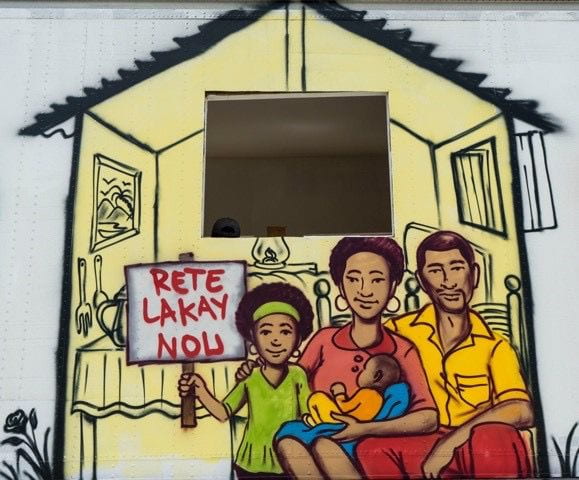
Graffiti by local artist, “Jerry,” on a trailer that serves as a Covid screening site at Belladère, one of four chief crossings into the Dominican Republic. Lettering reads: “Stay at home.” Photo by: Zanmi Lasante/Partners in Health
Numerous studies plot vaccine receptivity of different nations along a continuum — from total acceptance, to avoidance and delay, to refusal. In a study by Nature Medicine, 44% of more than 20,000 respondents cited fear of side effects as their primary inhibitor. Indeed, Haiti’s government declined a prior AstraZeneca donation, citing foreign regulators’ surveillance of blood clots in younger recipients. Once they decided to accept shipment, production delays arose in India.
Because Haiti’s July Moderna shipment was to expire November 6th, it returned approximately 250,000 doses in October for redistribution, but will only receive 100,000 replacements. Its position on the continuum is now unambiguous: near rejection. And it is not alone. Rates in more than 50 countries fall below 10%. More than other consumer products, if medicine is to be adopted, the public must trust it. Yet, the pandemic seems less about trust than breathless faith. As global bodies wrestle to be convincing, have we listened to what the people of Haiti are telling us they believe?
Born in Port-au-Prince, I returned this summer for a family emergency. I came to understand that I recognized coronavirus as something more savage than do residents. To understand, I ventured as a native daughter to query local doctors for observations about vaccine receptivity and in hopeful search of strategies that empower.
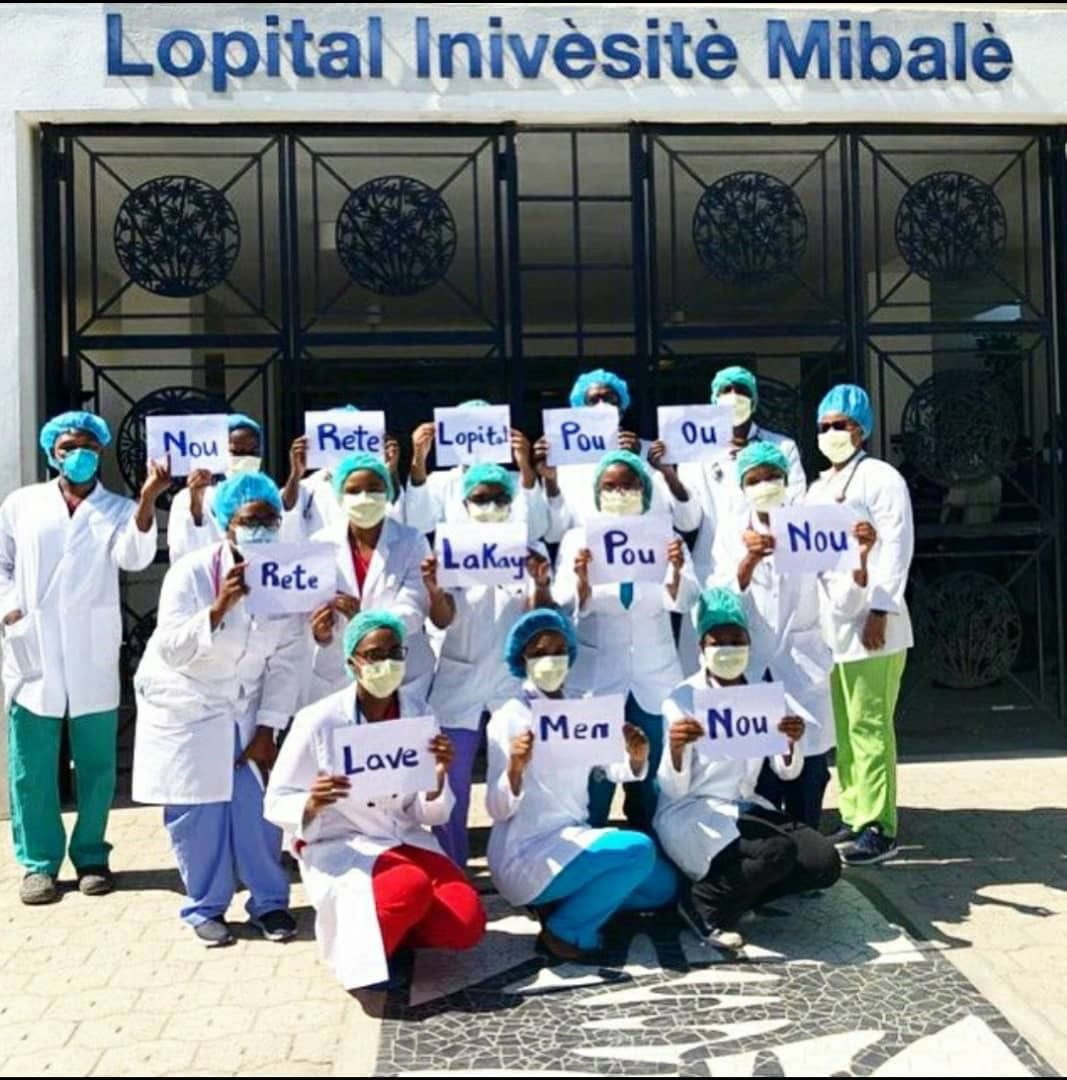
Staff of University Hospital in Mirebalais pose for a public service announcement: “We stay at the hospital so you can stay at home and wash your hands.” According to research, treating physicians, medical workers, traditional doctors, and birth attendants are the most trusted sources of Covid messaging.” Photo by: Zanmi Lasante/Partners in Health
Urban Choice: When “We Don’t Even Have Water”
Pacing in the courtyard of a hospital dedicated to the most critical Covid patients in Port-au-Prince was the last place I expected to find myself in the midst of a pandemic. The small clinic’s windows were flung open to the tropical breeze with obvious intent of improving air flow. Large oxygen tanks against a wall reminded that the virus ultimately assails one’s ability to gasp breathe. Staff on a balcony wore body suits, headdress, and face shields as they maneuvered an empty gurney. Their precautions lent me relief. I barely had time for the first of a two-dose regimen before springing out of the pandemic-torn zones of New York’s lockdown. Not fully protected, I felt stalked by the risk palpable in the air. Nor had it been easy to get here. For weeks, protests against kleptocracy blockaded roads with burning tires. Still, since it is precisely where patients must venture to wage their own fierce battles, answers are only found here.
One of the unmasked guards, who slid back iron gates to allow me into the compound, graciously offered me a metal seat. I declined politely. I maintained lockdown discipline: do not touch a-n-y-t-h-i-n-g. That knowing, sympathetic smile he flashed separated me—again—as etrangere (“foreigner”). Behind us stood washing stations with cheerfully-colored detailing: “wash hands,” “6-feet apart,” “mask up.” With an amused flourish, he asked if I was scared. I ducked sheepishly and queried instead in basic Creole why he was `al`aise (“at ease”). Had he been vaccinated? He replied softly, “No. But then, there really isn’t a lot of this disease in Haiti.”
His frankness echoed the sentiment I encountered in Port-au-Prince: Covid is not perceived as the (singular) immediate enemy. International media and, indirectly, reports by Haiti’s Ministry of Health affirmed this perception. As of October 25, Haiti’s metrics (23,406 infections; 658 deaths) barely approximate the global devastation, even with recent increases (67 new cases daily).

A Zanmi Lasante health worker helps to celebrate the first Haitian patient at HUM to make a full recovery and to return home after being intubated. Photo by: Zanmi Lasante/Partners in Health
As I waited, three male attendants seeming under age 35 struck up a lively dialogue with me. They recounted how people expressed reservations about vaccines, mostly because of “breakthroughs.” Many resolved infections were best left nen men Bondye (“in hands of God”). “They do not understand [it] keeps away symptoms and deaths, not [sickness],” one decried. They wanted high-risk groups such as the elderly and immunocompromised to take it. But, when asked whether any of them had availed themselves, one excused himself and walked away. The others planned to—eventually.
Not wanting to intrude, I asked in broad terms what single factor inhibits front line workers (themselves)? Their response mirrored results of various studies, but with a twist: indeterminate risk of side effects from a drug manufactured and tracked exclusively by foreign pharmaceutical companies. For the first time I wondered how many studies had been translated into Creole. The practitioners sought reliance on a scientific tradition of disciplined peer-review, not blind faith.
Their perspective foreshadowed a split in global consensus. Four Nordic countries stopped Moderna injections for males in the same age group as these Haitian attendants due to incidences of rare heart inflammation. Canada, the United States, Hong Kong, and Britain are among nations monitoring it. Even if foreign regulators accept the risk, absent a participatory voice in the scientific investigations that dictate the collective pandemic response, it is impossible to deny the impetus spurring hesitancy is the same as the vaccine: self-preservation.
Non-medical sectors of society reflect similar conflicts when trying to situate the pandemic rationally within daily routines. Radio hosts proclaim Covid a malady frequenting “rich people, who travel or entertain foreigners. We are supposed to wash all the time to stop it? But, p`ep la (“the people”) don’t always have soap, and some don’t even have water! We would be dying everywhere, Sir [chuckling].” The topic switches to self-evident plagues—gang-sponsored kidnappings, natural disasters, corruption, cannibalistic IMF policies, shortages (fuel, food, labor, electricity), neglect by international embassies, … well, priorities. In blunt contrast to Western messaging, vaccination remains a private choice between one’s doctor, conscience, and god(s), rather than a socially mandated imperative.

Zanmi Lasante staff and comunity health workers conduct rapid COVID testing of Haitians who are demonstrating symptoms at the Belladère border. The NGO provides these tests free of cost to patients, while other areas of the country get charged $85, or simply lack any tests at all. Photo by: Zanmi Lasante/Partners in Health
Rural Droughts: “Not in This Village”
[F]or the second time in a year, we are struggling against this fierce breathlessness. . . .We do not yet see a plateau. Those dead on arrival are not a few, and those who died in our care are not a few. . . [T]he world has created vaccines, but they are not here in Haiti. The world has created antivirals, but they are not here in Haiti. The world has created monoclonal antibodies, but they are not here in Haiti. Maybe they are here in some small quantity for the lucky or privileged.—“A Covid Update from St. Luke’s Hospital, Haiti” (June 18, 2021)
A month after St. Luke’s words, vaccines arrived. As in the rest of the world, they are most available in urban centers that exercise the privilege of choice. How then to frame perceptions in outlying regions, where government deployment of any resource predictably lags? Even in the United States, rural patients die over twice the rate. In remote Haitian villages, the sweep of lafy`ev la (“the fever”), as colloquially whispered, is sometimes invisible.
In September, I spoke via teleconference with researchers from Zanmi Lasante, sister organization to Boston-based Partners in Health. Haiti’s largest NGO healthcare provider, it operates in Haiti’s Central Plateau and Lower Artibonite regions. They shared preliminary observations (not yet published) from their studies examining vaccine receptivity, which included interviews with Catholic priests, pastors and school directors in rural areas of Haiti.
“[A]ccurate rates of infection remain unknown because of extremely low testing, especially in outlying areas,” says Mary Clisbee, Provost for Academic Affairs and Research at the University of Global Health Equity in Mirebalais, Haiti. As she spoke, I recalled that upon arriving I was shocked that a rapid test at the airport costs US$85 (average income is $132 monthly).
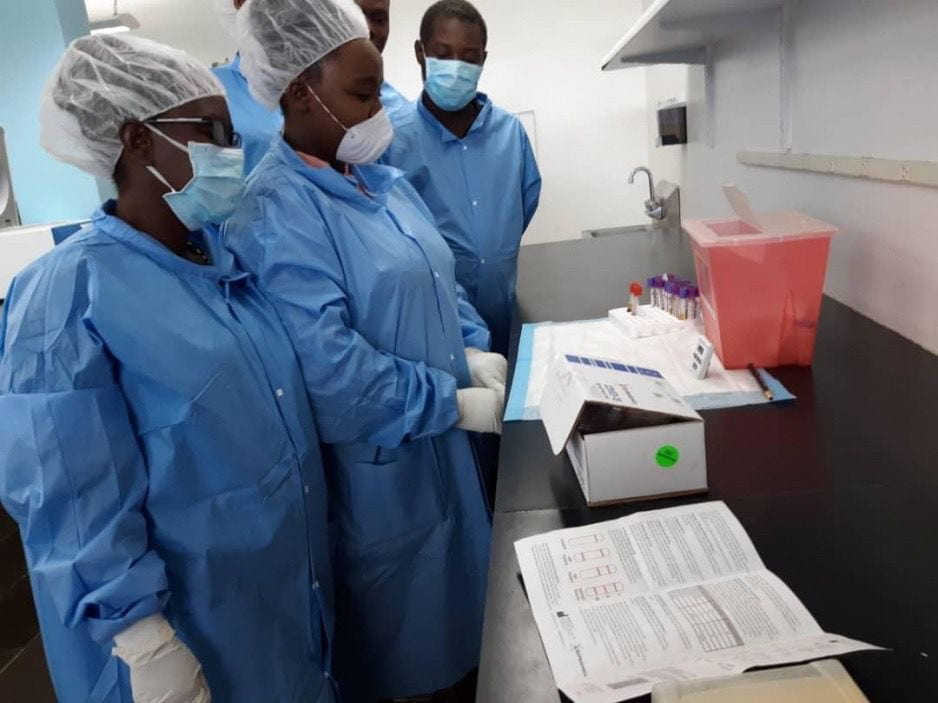
Zanmi Lasante staff train on COVID testing protocols. The NGO employs approximately 2,500 Haitian citizens as community health workers in the Central Plateau and Lower Artibonite regions. Scaled employment for health workers in urban, rural, coastal, and mountain regions could mutually advance medical and economic priorities. Photo by: Zanmi Lasante/Partners in Health
“[T]he leading hypothesis for the low death rate to date,” she continued, “is that half Haiti’s population is under 24. . . . [T]he elderly and medically compromised already face high morbidity because of a lack of health infrastructure. There may be a perception that a Covid death was otherwise inevitable, leading to a belief Covid is not a true medical ‘event’ nationally.” The Darwinian calculus astounded me as I considered, if proven, the lack of resources available for geriatrics.
Maurice Junior Chery, Research Coordinator and Institutional Review Board Coordinator, Zanmi Lasante, cautioned that the Ministry of Health recently announced the presence of Delta and Mu variants, both of which can cause severe illness in the young. The doctors expressed urgency to stave off any impending surge.
They named lack of access to delivery sites, transportation and communication strategies as barriers, especially after the recent earthquake damaged 62 health facilities. Under international pressure, the Ministry of Health did extend mobile units and radio announcements, but asserts it needs funding for social media influencers and expanded access. The team, however, stressed that logistics are the greater problem.
Still, considering vaccines are accessible near their facility, was there receptivity? “Very few people,” Kobel Dubique, MMSc-GHD, Research Coordinator, Zanmi Lasante, responded. “Some are suspicious that foreign programs run experiments, or mistakenly believe vaccines are only available to health and government workers. Others listen to fake news on social media or radio.” Spread of misinformation is not the lone driver of skepticism. Similar to minority communities in developed countries, Haiti has a verified history of medical exploitation. For example, a HIV trial by Cornell raised ethical concerns when it excluded access to anti-retrovirals the United States requires for its subjects.
Dr. Dubique then identified a dynamic increasing worldwide: forceful resistance to vaccine missions. “[M]embers of a local village told a health worker not to even try, or they would go after him, his family, or home. He feared even advocating . . .. That’s not the attitude everywhere, but it signals work needed to educate in a culturally appropriate way about novel drugs.” Again, Haiti is not alone (e.g., Guatemalan nurses held hostage after side effects). When severe illness is not experienced openly, the pandemic is mystified, and responses to it assume the symbolism of government or colonial manipulation.
Roslyn Phillips, MPH, International Program Director at the Restavek Freedom Foundation, warns that hesitancy and violence are not limited to the countryside. “Insecurity throughout Haiti is prohibitive. Violence . . . causes people to avoid movement, transportation or high-risk zones,” where clinics often are located. Dr. Dubique added, “Violence steals focus. People fear it more than Covid. And not just the virus; every aspect of public health” can be paralyzed.
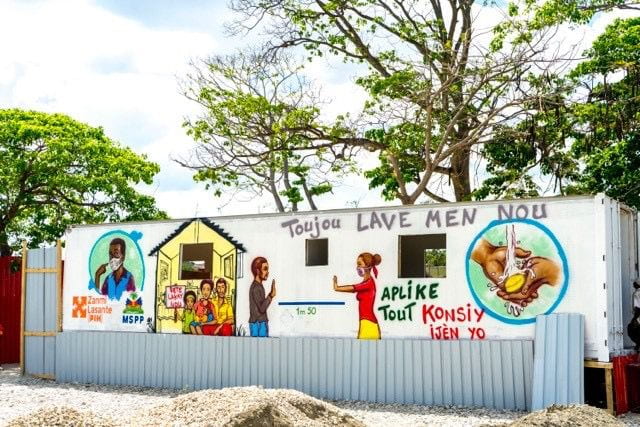
Local Haitian artist, ‘Jerry,’ invokes the insignia of Zanmi Lasante and Haiti’s Minister of Public Health and Population (MSPP) on a call to “Stay home. Social distance. Wash hands.” The PSA ends with: Apply all hygiene tips. Photo by: Zanmi Lasante/Partners in Health
And Still We Eye the Prize: A Collective Framework for Hope
One of the most influential intellectuals of 20th-century Haiti, Roumain was a founding member of indige´nisme, a cultural movement that rejected French imperialism and the U.S. occupation (1915-34). His novel inspires against succumbing to isolationist repression of either violence or a pandemic. In his tale, an act of brutality fails to upend Manuel’s quest to water the fields because the community unifies focus on building future promise in spite of bloodshed.
Here are some thoughts on how a united front can be strengthened to include communal voices when addressing the coronavirus vaccine:
- Leverage Existing Logistical Infrastructure of NGOs
Direct investments in NGO’s pressure-tested mechanisms. “Despite all challenges, we have found great hope,” says Dr. Dubique. “Respondents named medical providers as most trusted source for vaccine decisions, especially when involved in the community. Health workers are experienced in disseminating information, even with scarce resources or unrest.” Notably, the Pan American Health Organization (PAHO) trained 2,800 community health workers for Covid response, underscoring waged employment for education strengthens acceptance.
- Brief Traditional and Religious Sectors About Shifts in Science
Medical research routes from international laboratories to Haiti’s government, doctors and NGOs—mostly “online.” If persuading traditional cultures to consider experimental drugs calls upon an act of faith, the informal sector already imbues a spiritual aspect. The limited reporting available reveals Houngan and Mambo do believe the pandemic. Devising communication channels to brief villages about breakneck scientific discoveries, with traditionalists included in the discussion, may counter skepticism about severe illness and access to Western systems (e.g., radio roundtables by NGOs and universities). Even if they disagree about specific vaccines, so long as traditional sectors do not wield undue influence over personal health choices, the debate draws engagement.
Dr. Chery commented, “[Yes,] traditionalist priests, birth attendants, midwives, [and churches] are all ‘community leaders.’ . .. In our last survey, [they were the] second most trusted source. Despite the vaccine being novel, people have faith in community elders for advice about it.” Indeed, PAHO’s initial outreach included them. Moreover, as elders, they are demographically vulnerable, making their voice—in Creole—personal.
- Deploy a Systematic Strategy for Testing and Coding
Absence of data shapes public perception. There has been no systematic testing to inform about course of infection, including asymptomatic, which may amount to passive propaganda. Records may also misclassify cause of death as age or underlying condition. While COVAX delivered vaccines, volumes of testing (rapid, laboratory, at-home) and coding technology are needed, and for free.

Zanmi Lasante staff, who collaborated closely with Haiti’s Minister of Public Health and Population (MSPP), conduct discussions about Covid screening protocols with Dominican health officials at the shared border. Photo by: Zanmi Lasante/Partners in Health
- Stock a Reserve of Therapeutics and Instruments
Baseline hesitancy is inevitable, technology constrains distribution (e.g., cold storage), and neither breakthroughs nor variants are predictable. Merck’s robust licensing agreement underscores public access is critical for therapeutics such as monoclonal antibodies and antivirals, as well as equipment such as loaned ventilators, portable storage, pulse oximeters and thermometers—free or at cost. With proven efficacy of discoveries, the lack of campaigns in developing countries about therapeutics, alongside vaccines, is unconscionable. Since life expectancy in Haiti is 64, seniors are a limited pool who require smaller stockpiles.
- Include Haiti’s NGO Medical Sector in Clinical Trials (as “Observers”)
Moderna announced it will not enforce its patent. South Africa then accepted the mantle to develop a vaccine based on the demographics of emerging markets. To place trials in the Caribbean bloc, anti-exploitation regulations are needed (e.g., public registries, compensation, access to trialed drugs, anti-opioid abuse). Meanwhile, officials and NGOs could include Haitian physicians and scientists as “observers” of clinical trials in the West, Asia ad Africa (i.e., investigative capacity exchanges).
- Secure Patients, Health Workers and Channels
Finally, after the earthquake, the Haitian Prime Minister requested that the United States military assist the country by sending troops to safeguard key infrastructure, which should include medical and vaccine facilities during a pandemic. The United States declined. Yet, there must be increased security for patients and healthcare workers. Otherwise, all other Covid efforts will be in vain. Mistakes from the past, when the U.N. peacekeepers were allowed to exploit the populace can be monitored, avoided, contractually insured, or else prosecuted
It is undeniable that the choice to take a vaccine within a safe zone versus a war zone is meaningfully different. Haiti needs honest and accountable support to get its people vaccinated.
Charlene Morisseau, Harvard ‘95 (Cabot House), president of “Charlemagne and Delinois Morisseau Foundation for Haiti’s Development,”which sponsors projects that can be scaled for-profit by island residents. Contact: C.DMorisseauFoundation@gmail.com.
Related Articles
A Review of Cuban Privilege: the Making of Immigrant Inequality in America by Susan Eckstein
If anyone had any doubts that Cubans were treated exceptionally well by the United States immigration and welfare authorities, relative to other immigrant groups and even relative to …
A Review of Conservative Party-Building in Latin America: Authoritarian Inheritance and Counterrevolutionary Struggle
James Loxton’s Conservative Party-Building in Latin America: Authoritarian Inheritance and Counterrevolutionary Struggle makes very important, original contributions to the study of…
Endnote – Eyes on COVID-19
Endnote A Continuing SagaIt’s not over yet. Covid (we’ll drop the -19 going forward) is still causing deaths and serious illness in Latin America and the Caribbean, as elsewhere. One out of every four Covid deaths in the world has taken place in Latin America,...

